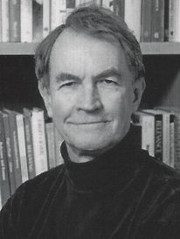Joining us this month to talk about a foundational topic in the philosophy of language is Michael Devitt, Distinguished Professor of Philosophy at the City University of New York, Graduate Center. Click here to listen to our conversation with him.
 Some animals make noises to express emotions they’re having. But other animals–notably, we humans–make utterances that do more. We do more than cry out in anger, laugh, and greet each other; we also refer to things and states of things in the world. Reference, some philosophers would argue, is the basis of our being able to convey more than just what we’re feeling inside. The fact that some of the words we utter refer to objects in the world is what allows us to convey information about the world.
Some animals make noises to express emotions they’re having. But other animals–notably, we humans–make utterances that do more. We do more than cry out in anger, laugh, and greet each other; we also refer to things and states of things in the world. Reference, some philosophers would argue, is the basis of our being able to convey more than just what we’re feeling inside. The fact that some of the words we utter refer to objects in the world is what allows us to convey information about the world.
But what does it take for a word to refer to (or stand for) something? Although that seems like a fairly basic question, philosophers have found that giving it a satisfying answer will probably require a more sophisticated theory than one would expect. You might think that the name Matt refers to me, the person, just in case there is implicit agreement among English speakers that they’ll follow the convention of referring to me with that name. But of course most people in the world don’t know who I am, and yet could still understand a conversation two other people were having about me without having any idea who the name refers to. Someone who didn’t know who I was could even then correctly use the name Matt to refer to me, by then entering into that conversation. So the obvious theory of reference, once you start to think about how it would go in detail, immediately gets into unexpected difficulties. More generally, it is questions about how much a person has to know in order to successfully refer to something that make it so difficult to articulate a satisfying account of what it means for a word to refer.
Join us as Michael Devitt explains his own approach to the problem, which is sometimes nicknamed the causal theory of reference.
Matt Teichman
Leave a Reply